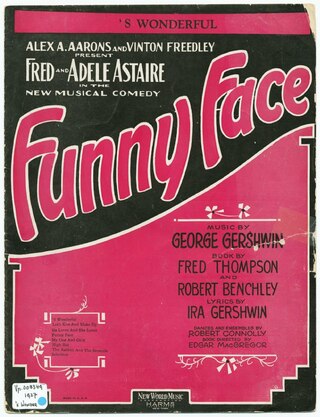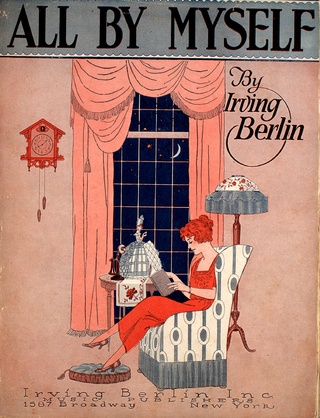Related Research Articles
"All Alone" is a popular waltz ballad composed by Irving Berlin in 1924. It was interpolated into the Broadway show The Music Box Revue of 1924 where it was sung by Grace Moore and Oscar Shaw. Moore sat at one end of the stage under a tightly focused spotlight, singing it into a telephone, while Oscar Shaw sat at the other, doing the same.
"Heat Wave" is a popular song written by Irving Berlin for the 1933 musical As Thousands Cheer, and introduced in the show by Ethel Waters.
"Too Marvelous for Words" is a popular song written in 1937. Johnny Mercer wrote the lyrics for music composed by Richard Whiting. It was introduced by Wini Shaw and Ross Alexander in the 1937 Warner Brothers film Ready, Willing, and Able, as well as used for a production number in a musical revue on Broadway. The song has become a pop and jazz standard and has been recorded by many artists.
"Please Don't Talk About Me When I'm Gone" is a song published in 1930. It was written by Sam H. Stept with lyrics by Sidney Clare. The original publication also credited singer Bee Palmer as co-composer.
"But Not for Me" is a popular song originally written by George Gershwin and Ira Gershwin for the musical Girl Crazy (1930).
"This Can't Be Love" is a show tune and a popular song from the 1938 Rodgers and Hart musical The Boys from Syracuse when it was sung by Eddie Albert and Marcy Westcott. The lyrics poke fun at the common depiction of love in popular songs as a host of malignant symptoms, saying, "This can't be love because I feel so well."

"Somebody Loves Me" is a popular song, with music written by George Gershwin, and lyrics by Ballard MacDonald and Buddy DeSylva. The song was published in 1924 and featured in George White's Scandals of 1924.
"Hello, Young Lovers" is a show tune from the 1951 Rodgers and Hammerstein musical, The King and I. It is sung by Anna, played by Gertrude Lawrence in the original Broadway production; by Valerie Hobson in the original London West End production; and by Deborah Kerr in the film version.
"It's Easy to Remember " is a popular song written by Richard Rodgers with lyrics by Lorenz Hart.
"I've Got The World on a String" is a 1932 popular jazz song composed by Harold Arlen, with lyrics written by Ted Koehler. It was written for the twenty-first edition of the Cotton Club series which opened on October 23, 1932, the first of the Cotton Club Parades.
"South of the Border Down Mexico Way" is a popular song describing a trip to Mexico, written by Jimmy Kennedy and Michael Carr and published in 1939 for the film of the same name starring country star Gene Autry.

"'S Wonderful" is a 1927 popular song composed by George Gershwin, with lyrics written by Ira Gershwin. It was introduced in the Broadway musical Funny Face (1927) by Adele Astaire and Allen Kearns.
"Street of Dreams" is a song and foxtrot composed in 1932 by Victor Young, with lyrics by Sam M. Lewis. There were three successful recordings of the song in 1933 by Guy Lombardo, Ben Selvin and Bing Crosby.
"Witchcraft" is a popular song from 1957 composed by Cy Coleman with lyrics by Carolyn Leigh.
"Isn't This a Lovely Day?" is a popular song written by Irving Berlin for the 1935 film Top Hat, where it was introduced by Fred Astaire in the scene where his and Ginger Rogers' characters are caught in a gazebo during a rainstorm. The lyric is an example of a song which turns a bad situation into a love song, a common style for Irving Berlin, as in I've Got My Love to Keep Me Warm and Let's Have Another Cup of Coffee.
"Reaching for the Moon" is a popular song written by Irving Berlin for the 1930 musical film of the same name.
"I Let a Song Go Out of My Heart" is a 1938 composition by Duke Ellington, with lyrics added by Irving Mills, Henry Nemo and John Redmond. The song became a number one hit for Ellington in 1938. Other hit versions the same year were by Benny Goodman, Connee Boswell, Hot Lips Page, and Mildred Bailey. It was performed as part of The Cotton Club Parade of 1938.
"(You'd Be So) Easy to Love" is a popular song written by Cole Porter for William Gaxton to sing in the 1934 Broadway show Anything Goes. However Gaxton was unhappy about its wide vocal range and it was cut from the musical. Porter re-wrote it for the 1936 film Born to Dance, where it was introduced by Eleanor Powell, James Stewart, and Frances Langford under its alternate title, "Easy to Love". The song was later added to the 1987 and 2011 revivals of Anything Goes under the complete title "You’d Be So Easy to Love".

"Remember" is a popular song about nostalgia by Irving Berlin, published in 1925. The song is a popular standard, recorded by numerous artists.

"All by Myself" is a popular song written by Irving Berlin, published in 1921.
References
- ↑ "Internet Broadway Database". ibdb.com. Retrieved October 11, 2017.
- ↑ "Discogs.com". Discogs.com. Retrieved October 11, 2017.
- ↑ Whitburn, Joel (1986). Joel Whitburn's Pop Memories 1890-1954. Wisconsin, USA: Record Research Inc. p. 416. ISBN 0-89820-083-0.
- ↑ "The Online Discographical Project". 78discography.com. Retrieved October 11, 2017.
- ↑ "Frank Sinatra Discography" . Retrieved October 11, 2017.
- ↑ Whitburn, Joel (1986). Joel Whitburn's Pop Memories 1890-1954. Wisconsin, USA: Record Research Inc. p. 392. ISBN 0-89820-083-0.
- ↑ "allmusic.com". allmusic.com. Retrieved October 11, 2017.
- ↑ "A Bing Crosby Discography". BING magazine. International Club Crosby. Retrieved October 10, 2017.
- ↑ "allmusic.com". allmusic.com. Retrieved October 10, 2017.
- ↑ "Discogs.com". Discogs.com. Retrieved October 11, 2017.
- ↑ "Discogs.com". Discogs.com. 1998. Retrieved October 11, 2017.
- ↑ "allmusic.com". allmusic.com. Retrieved October 11, 2017.
- ↑ "allmusic.com". allmusic.com. Retrieved October 11, 2017.
- ↑ "Discogs.com". Discogs.com. Retrieved October 11, 2017.
- ↑ "Discogs.com". Discogs.com. Retrieved October 11, 2017.
- ↑ "allmusic.com". allmusic.com. Retrieved October 11, 2017.
- ↑ "Discogs.com". Discogs.com. Retrieved October 11, 2017.